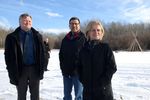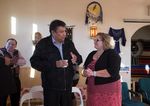Alberta's Path to Reconciliation - February 2019 - Alberta.ca
←
→
Page content transcription
If your browser does not render page correctly, please read the page content below
Alberta’s Path to Reconciliation
February 2019
Following months of collaboration with survivors of the
Sixties Scoop, Premier Notley also apologized for a
decades-long practice of removing Indigenous children
from their homes, their families and their culture. Alberta is
continuing to work with the Sixties Scoop Indigenous
Society of Alberta to raise awareness and improve
government policies and practices.
The Premier’s commitment remains strong. This summer,
she signed an agreement with the Lubicon Lake Band and
the Government of Canada, settling a longstanding land
claim and empowering this northern Alberta First Nation.
United Nations Declaration on the Rights of
Rachel Notley’s government has worked to make life
Indigenous Peoples
better for Indigenous people, one of the fastest growing
and most culturally diverse populations in the province.
Over the past four years, the Alberta government has
strengthened partnerships with First Nations, Métis and
Inuit communities, organizations and people.
Taking Responsibility for the Past
Following the 2015 election, Alberta began implementing
the principles of the United Nations Declaration on the
Rights of Indigenous Peoples.
The province is incorporating Indigenous perspectives and
concerns in government policies and practices.
Actions include:
Reconciliation means coming to terms with the past, Alberta’s new K-12 school curriculum better reflects
including failed government policies and practices. Indigenous contributions and history, including
residential schools and the Sixties Scoop.
After the 2015 election, Premier Rachel Notley apologized Alberta was the first province to make a commitment to
for Alberta’s failure to stop the federal Indian Residential equal access to health care under Jordan’s Principle
School system. She also voiced support for a national and sign an agreement with First Nations and the
inquiry into Missing and Murdered Indigenous Women and Government of Canada.
Girls. Alberta has committed $200 million for clean water on
First Nations and for improved housing for a growing
Both steps were public acknowledgements of historic Indigenous population in Alberta’s urban centres and
abuse, violence and intergenerational trauma experienced Metis Settlements.
by Indigenous peoples in Alberta.
For more information about Alberta’s work on reconciliation and
the UN Declaration on the Rights of Indigenous Peoples,
visit www.indigenous.alberta.ca.Health and Wellness
Reconciliation requires understanding the pressing
needs of Indigenous people and communities.
New quality standards for teachers require knowledge
and competency of Indigenous history and culture.
More than $50 million to support First Nations, Métis
and Inuit students attending provincial schools.Historic
agreements with the Maskwacis education authority
and Kee Tas Kee Now Tribal Council for providing
Actions include: support and resources.
A $100-million commitment is bringing clean drinking Nearly 4,500 free municipal library cards were issued
water systems to reserves. Projects are complete at to residents of First Nations and Metis Settlements for
Paul First Nation and Alexis Nakota Sioux First Nation. the first time in Alberta’s history.
A maternal health pilot program in Maskwacis, Little Nearly $10 million to protect and promote Indigenous
Red River Cree Nation and inner-city Edmonton. languages, including Calgary’s first ever Indigenous
Pregnancy Pathways program that provides housing Languages Resource Centre.
and neonatal care to pregnant, homeless Indigenous More than $40 million in supports and scholarships for
women. Indigenous students.
The Kind Heart Project at Alexis Nakota Sioux Nation The Indigenous Peoples Atlas of Canada were
and the Metis Settlements Fetal Alcohol Spectrum distributed to every junior high and high school in
Disorder (FASD) Network Project. Alberta.
Over $600,000 for Indigenous student mental health
supports at 15 post-secondary institutions. Supporting Indigenous Children and Families
$5M in new funding for Indigenous community-based
opioid responses, and more than $2 million for a safe
withdrawal site at Kainai First Nation (Blood Tribe).
Staff training for Alberta Health Services to help staff
better understand Indigenous history and culture.
The Building Communities of Care grant program will
help address the continuing care needs of Indigenous
communities.
Education
Reconciliation involves helping children understand
the past while preparing them for the future.
Reconciliation is more than a gesture, it is action to
Since the 2015 election, Alberta has worked to ensure
reduce poverty and support families.
Indigenous students have opportunities to succeed while
using traditional skills and language.
Actions include:
$100 million for Indigenous owned and operated
Actions include:
housing in urban centres.
Alberta’s new K-12 school curriculum better reflects
Minimum wage increased to $15/hr, highest in Canada.
Indigenous contributions and history, including
New Alberta Child Benefit provides a benefit to families
residential schools and the Sixties Scoop.
earning less than $41,220 per year (up to $2,740).
For more information about Alberta’s work on reconciliation and
the UN Declaration on the Rights of Indigenous Peoples,
visit www.indigenous.alberta.ca. Five new $25-a-day child care centers offering create local jobs, reduce energy bills and achieve greater
Indigenous-focused programming. economic and energy sovereignty.
Alberta’s innovative agreement with First Nations and
Canada to implement Jordan’s Principle for equal
access to health care.
Changes to legislation to ensure First Nations are
informed about private guardianship applications.
Guardianships for kids in care must include home
studies and cultural plans.
Increased annual funding for Native Friendship
Centres. Additional funding for nearly 20 organizations
and municipalities to support urban Indigenous people,
including the New in Town Aboriginal Welcome Service
program, provided by Bent Arrow Traditional Healing In 2017-18, Alberta provided $35 million from the carbon
Society.
levy to 125 projects in 66 Indigenous communities and
organizations, which will result in 265,000 tonnes of
greenhouse gas reductions. This funding increased to
almost $50 million in 2018-19.
As part of Alberta’s commitment to reach 30 per cent
renewable electricity by 2030, the province included an
Indigenous-ownership requirement for over 300 MW of
bids into the Renewable Energy Program. As a result, the
In addition to addressing poverty, since the 2015 election
actions have been targeted to help support Indigenous
women and girls, who are three times more likely to
experience violence.
Actions include:
Increased funding for women’s shelters by $15 million
and another $8 million for sexual assault centres.
Violence prevention programs in places like Peavine Paul Band, Blood Tribe and Sawridge First Nation are
Metis Settlement and Wabasca. successfully partnering on major wind power projects
Establishing Alberta’s Anti-Racism Initiative, which worth nearly $600 million in southern Alberta with more
supports Indigenous organizations and communities in expected in the future.
fighting racism.
Annual operational funding for the Institute for the
A new $3.3-million grant will also help Fort Chipewyan
Advancement of Aboriginal Women.
construct a 7,500 panel solar farm that will help the
Community grants for organizations like Tsuut’ina
community reduce its reliance on diesel.
National Police Service and the RIEL Institute.
Climate leadership Consultation and Engagement
Reconciliation means working to balance economic Reconciliation involves listening, then moving
development and environmental sustainability. towards better processes and practices.
Since 2015, Alberta has partnered with Indigenous Since 2015, Alberta has worked to ensure Indigenous
communities and organizations to reduce emissions, peoples have a bigger say in government policies and
land use decisions impacting their communities.
For more information about Alberta’s work on reconciliation and
the UN Declaration on the Rights of Indigenous Peoples,
visit www.indigenous.alberta.ca.Actions include: Since 2015, Alberta has increased efforts to help
Historic protocol agreements have been signed with communities improve economic self-reliance.
Treaty 8 First Nations of Alberta and the Blackfoot The Aboriginal Business Investment Fund helps
Confederacy. Indigenous community-owned businesses build new
commercial ventures including retail, communications and
heavy equipment.
The province also supported the creation of Indigenous
Tourism Alberta, an association that provides specialized
support for Indigenous communities as they look for ways
to foster and develop tourism in their communities.
Justice
A new 10-year Framework Agreement with the Métis
Nation of Alberta has been signed.
An historic agreement with the Treaty 8 Trappers
Association in northern Alberta was ratified.
Implementation of Alberta’s first consultation policy for
Metis Settlements.
Ongoing work with First Nations and Metis Settlements
has resulted in 33 revisions to the geographic areas in
which consultation is directed helping enable more
effective consultation.
Reconciliation means creating a fairer, accessible and
A commitment to cooperative management
just legal system for Indigenous people.
agreements for all new protected areas in Alberta,
including the Piikani Nation for the Castle parks.
Actions include:
Base consultation funding for Indigenous communities
New protections for victims of sexual violence, removal
has increased from 7 million to $27 million per year.
of time limits for civil claims, allowing victims to break
An Indigenous Wisdom Advisory Panel now advises
residential leases to flee abusers.
Alberta’s chief scientist on environmental monitoring.
Protection through legislation of unpaid leave and job
The largest protected boreal forest area in the world
protection in cases of domestic violence.
was created through cooperation with First Nations and
Three Indigenous women appointed as judges.
Métis communities in northern Alberta.
Additional funding for restorative justice, youth
New legislation requires First Nations and Metis
counselling and victims of crime.
Settlements to be consulted concerning the placement
of polling stations during provincial elections. New court houses in Red Earth Creek and Fort
Vermillion include ceremonial spaces.
Economic Development A $70-million increase over four years to Legal Aid
Alberta, ensuring better representation for low-income
and vulnerable people.
Reconciliation cannot be achieved without working
towards a more equitable economic future.
For more information about Alberta’s work on reconciliation and
the UN Declaration on the Rights of Indigenous Peoples,
visit www.indigenous.alberta.ca.You can also read



























































